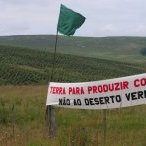English · Español

8 October 2014 | Interviews | Meeting on Large-scale Monocultures in Latin America | Land grabbing | Forests and biodiversity
Green deserts in Latin America: Interview with the coordinator of the World Rainforest Movement
Download: MP3 (2.4 Mb)
Several decades have passed since the first tree monoculture plantations were established in Latin America. The features of their establishment seem to be the same in the new countries of the region where this production model is advancing. In this interview with Winnie Overbeek, international coordinator of WRM (The World Rainforest Movement), we talked about the ways these monoculture plantations are being imposed, their socioenvironmental consequences and the new ways in which these crops continue to advance on the continent.
At the beginning of the interview, Winnie talked about the monoculture models in Latin American countries that were implemented through a series of incentives by governments and international financial institutions during the 60s and 70s. In terms of the causes of this introduction, he made reference to the role of the companies involved in the business, which proposed "profitable businesses due to the availability of cheap lands and lower salaries; in addition to the fact that the tree growth cycle in Northern countries took 50 to 60 years, while they planned to reduce it to 6-7 years in the countries of the South".
About their impacts, both social and environmental, Winnie highlighted the consequences this model has on the lands, which in most cases mean to take lands from rural or indigenous communities: "while for the companies the land is just a means to make money, for the communities, the territory is used to grow food, and forests are used for many basic things related to their livelihoods. Taking these lands away from the communities has a strong impact".
To this social consequence, the activist added one of the false promises of the model, the generation of job opportunities for the local community: "One hundred hectares of eucalyptus generate one job source nowadays. So this promise of improving the lives of the local communities is not met, because the people were left without lands and also because the promise to generate job sources was false".
On the violent nature of the advance of these models on Latin American soil, Winnie said that one of the strategies of the model, both at the beginning of its implementation and now, is choosing lands over which communities don´t have any property title. "In the best of cases, communities were given some money, but in most cases, if people didn´t want to sell their lands, they were threatened. Let´s remember that many countries were going through a dictatorship, so the evictions were conducted by the police and military forces, often setting on fire their houses and crops".
New tools for the advance over the territories
The advance of the monoculture model cannot be understood outside of a context of crisis of the capitalist model, said the activist. In order to seek new ways to make profit, the system uses other crises with the excuse of bringing solutions to them. "Today, plantations are presented as carbon sinks; they state that plantations absorb carbon and that this will mitigate the climate crisis. This is a lie. Plantations absorb carbon, but after a certain number of years, the trees are cut down, and so all the carbon they had absorbed returns to the atmosphere.
This without even taking into consideration the large amounts of fossil fuels used by the forestry-cellulose model, through agrotoxics, transportation and all the machines that transform timber into other products, which are essential for this production model.
The tree monoculture model was strengthened after the crisis in 2008, said Winnie. New investment strategies started to appear. With financial capital in the business, lands are transformed in titles negotiated by Investment Funds in Stock Markets and people start speculating over the price of land based on the profits they can obtain from these plantations, promoted as "safe investments". This process is increasing the pressure over the land and causing the weakening of labor and environmental laws in Latin American countries.
Imagen: ongcea.eco.br







